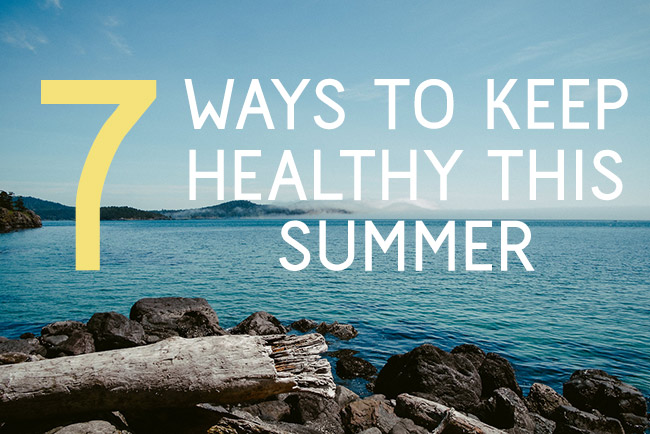
As the pandemic eases and travel restrictions lift, many are planning long-overdue summer getaways. Whether you’re driving a couple of states over to visit family or hopping on a plane to see the sights, these health tips for summer will help you stay healthy while traveling.
Make sure you have a current medical plan, and catch up on any missed medical appointments. Also, be mindful of elderly neighbors or loved ones and make sure they are staying safe in the heat.
Drink Water
Hydration is important year-round, but it’s especially essential during the summer months when sun exposure increases and dehydration risks are higher. Water is the best option, but unsweetened tea or coffee, non-caffeinated fruit juices with no added sugars, and hydrating fruits and vegetables are good choices.
Take advantage of in-season fruits and vegetables to help balance your diet. Some great summer options include tomatoes, cantaloupe, watermelon, cucumbers and mint. In addition to helping you stay hydrated, these foods also provide a variety of nutrients and can help you feel your best.
Wear Sunscreen
The sweet summertime sun feels great, but even short exposures can damage skin and increase the risk of skin cancer. Make sunscreen a staple in your summertime routine, and remember to schedule an annual dermatology skin screening.
Choose a sunscreen that is water-resistant and broad spectrum. Look for ingredients like avobenzone and zinc oxide to provide full coverage. Don’t forget to apply a generous amount, especially on easy-to-miss spots such as the tops of your ears and the backs of your knees.
Exercise outside in the cool morning or evening to take advantage of the fresh air and lower temperatures. This will help prevent heat exhaustion and improve the effectiveness of your workout.
Stay Hydrated
With hot temperatures and outdoor activity comes the need to prioritize hydration. Water optimizes blood pressure, regulates body temperature, lubricates joints and carries nutrients to the cells.
Eat foods high in water content such as strawberries, melon, cucumbers and tomatoes. Foods rich in potassium, magnesium and fiber such as nuts, seeds and whole grains are also good sources of hydration.
Be mindful of how much you eat at cookouts and picnics and avoid skipping meals in anticipation of overindulging. This can lead to mental and physical fatigue. If you notice signs of heat exhaustion, such as heavy sweating, dizziness or lightheadedness, stop activity and get into a cool place and drink water.
Wear Light Clothes
With the longer days and bright sunshine, summertime is a great time to kickstart new wellness habits. Taking up a healthy hobby, like gardening or biking, or taking an extra long walk are just some of the simple summer activities that can help keep you on track with your health goals.
When choosing your summer wardrobe, opt for light-colored clothes. Dark colors absorb the sun’s rays, which then turns them into heat and can cause you to overheat. While petal pink, stone blue, and morning-inspired yellows reflect the sunlight and keep you cool.
Wear Sunglasses
Sunglasses are a stylish summer accessory but they are also one of the most important health accessories you can wear. Sunglasses not only shield your eyes from the harmful rays of the sun but they can also prevent wrinkles by eliminating squinting!
For those with hay fever, wearing sunglasses can help to alleviate the symptoms by filtering out pollen. For anyone suffering from migraines, the bright light of summer can be a trigger, so sunglasses can also help to minimize headaches by blocking out the sunlight’s brightness. Adding sunscreen to your sunglasses can further reduce the risk of UV rays damaging your skin.
Wear Insect Repellent
The summertime brings outdoor fun, but also mosquitoes and ticks that can carry disease-causing germs. Make sure you and your family are protected with repellent that contains DEET for skin and permethrin for clothes to keep bugs at bay.
If spraying yourself with chemicals isn’t your thing, try a repellent made from natural ingredients such as lemon eucalyptus oil or picaridin. For added protection, some outdoor clothing companies offer clothes infused with repellent so you can skip the sticky spray. And if you’re planning to spend days outdoors, treat your gear with permethrin to kill ticks and fleas too.
Check for Ticks
Summer is the season for outdoor activities, but it’s important to check yourself and your family for ticks – especially in wooded and brushy areas. Wear long pants and sleeves, tuck your socks into your shoes and apply products that contain DEET or permethrin to clothing to keep ticks away. Showering soon after coming indoors will also wash off unattached ticks.
Ticks can carry bacteria and viruses that cause illness, such as Lyme disease or the newer Powassan virus. A bite from a tick can lead to symptoms such as headaches, fatigue, a rash and nerve pain.